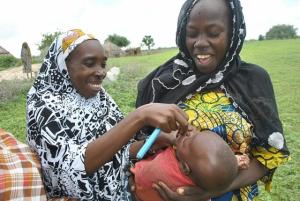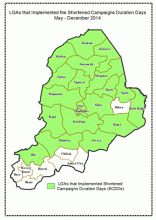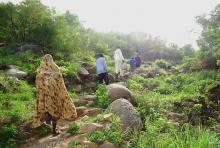Nigeria scales up local innovations to immunize children in insecure areas
Abuja, 28 February 2015 -- In determined efforts to interrupt poliovirus circulation in Nigeria, the surge capacity personnel of the World Health Organization (WHO) continues to support the government to implement special innovations of the National Polio Eradication Emergency Plan to reach and cover areas with extant insecurity in Borno and Yobe States.
The Boko Haram insurgency continues to have negative impacts on the security situation and consequently life-saving immunization services and other health interventions in the north eastern part of Nigeria. For example, in June 2014, only 20% (2431 out of 12 123) settlements were inaccessible due to insecurity. The situation further deteriorated in January 2015 preventing large-scale polio campaigns to reach 67% of settlements (8516 out of 12 634) in the area.
One of the local innovations implemented was the Shortened Campaign Duration Days (SCDDs), aptly coined ‘hit and run’, targeting under-five children in areas that were inaccessible due to insurgency. SCDDs are discreet rapid immunization activities that do not attract attention in order to reduce exposure to militants. The campaign is conducted over the shortest possible period and usually lasts one day versus the normal four days.
SCDDs was piloted in two local government areas (LGAs) of Borno State in June 2013 but expanded to 18 others as well as four in Yobe State. Documented evidence shows that from May to December 2014, 138 106 children have been immunized with oral polio vaccines in the security compromised areas of Borno.
The WHO surge capacity personnel support the government to implement this strategy and are widely acknowledged, even by the Polio Independent Monitoring Board (IMB), as contributing immensely towards interruption of poliovirus in Nigeria. According to Dr Mahmood Saidu, the WHO State Coordinator, “the goal is to ensure that the objectives of the Global Polio Eradication Initiative are met without compromising the safety of our personnel.”
The strategy follows a simple pattern. Firstly, it leverages relationships with local leaders to identify potentially safe windows for conducting rapid campaigns in otherwise insecure communities. This is closely followed by a rapid but detailed security risk assessment and a micro plan is developed with stakeholders to quadruple the number of vaccination teams. Local vaccination teams are then engaged and deployed thereafter with potent vaccines to the affected areas and supervised.
Borno has conducted at least four catch-up SCDDs in areas that did not participate in normal immunization campaign rounds in 2014. This assisted to boost population immunity and respond to circulating vaccine derived polioviruses outbreaks. In total, 198 isolated SCDDs have been conducted since piloting.
These activities have contributed immensely to the reduction of wild poliovirus (WPV) transmission, with no cases reported in 2014 compared to 17 in 2013.
Commenting on SCDDs, Dr Sule Meleh, Executive Director of Borno State Primary Health Care Agency, described it as “laudable despite the risks involved. Without this strategy, it would have been impossible to reach the multitude of children who would otherwise have been missed due to insecurity”.
One female vaccination team member who implements the strategy in Gwoza observed that “we are always afraid whenever we go out for the hit and run campaign. We always hide our vaccine carriers under our hijab in case we meet insurgents on our way”. A male team member also observed “we dress in funny ways and usually avoid routes frequently travelled by the insurgents. Every minute in the bush and settlements bring us close to being attacked, abducted or even killed. Thank God, we are still alive and will continue to take the risk to help our people”.
Plans are underway to scale up SCDDs in other security compromised LGAs and States. The risks are great given the recent upsurge in attacks by Boko Haram but necessary to save the lives of innocent victims and prevent the terrible effects of lifelong polio paralysis and complications.
__________________________________________
For more information, please contact:
Technical contacts:
Dr Pascal Mkanda; Tel: +234 803 402 2140; Email: mkandap [at] who.int (mkandap[at]who[dot]int)
Dr Khalid Abdelrahim; Tel: 234 803 402 1284; Email: abdelrahimk [at] who.int (abdelrahimk[at]who[dot]int)
Media contact:
Ms Charity Warigon; Tel: +234 810 221 0093; Email: warigonc [at] who.int (warigonc[at]who[dot]int)
__________________________________________
Borno map showing LGAs that implemented SCDDs
SCDDs team trekking to a settlement





